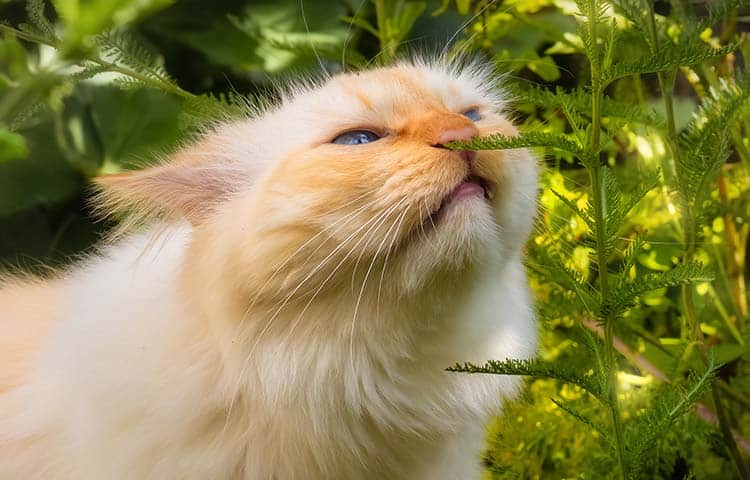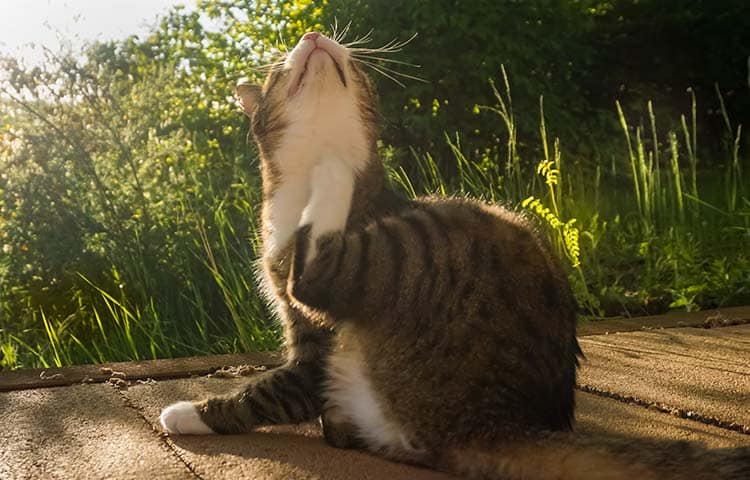Tick Paralysis in Cats: Signs, symptoms and what Australian pet owners need to know
With tick paralysis moving fast in 24–72 hours, recognising early signs could save your cat.
Read more14 November 2025
Spring has arrived, bringing with it longer, sunnier days and lush, blooming gardens. It’s a wonderful season for getting outdoors and enjoying the beautiful Australian weather with your pets. But as the landscape comes to life, a new set of risks emerges for our curious furry friends.
While many of us are aware of common dangers like ticks and snakes, other hazards are less obvious and can catch even the most diligent pet owner by surprise. This guide will walk you through the surprising and familiar risks of spring, helping you keep your pet safe, healthy, and happy all season long.
Jump to:
Spring’s beauty can sometimes hide potential problems. From the bulbs in your garden bed to the pollen in the air, here are some of the less obvious hazards to be mindful of.
That beautiful bouquet of spring flowers often starts as a bulb planted in your garden. For a dog that loves to dig, these bulbs can look like a fun new toy. However, many popular spring bulbs are toxic if chewed or eaten.
Daffodils, tulips, hyacinths, and crocuses contain compounds that can cause drooling, vomiting, and diarrhoea. In more serious cases, ingesting a large number of bulbs can lead to breathing difficulties or heart problems. The highest concentration of toxins is found within the bulb itself, making them particularly dangerous.
Actionable tip: If you have a dedicated digger, consider fencing off your garden beds or covering newly planted areas with mesh. You can also choose pet-friendly plants to add colour to your garden without the worry. For more information, check out our guide to toxic plants in your garden.

Beyond bulbs, many common garden plants that flourish in spring can be harmful to pets. It’s easy to overlook these dangers when landscaping. Some plants to be particularly wary of include:
Even plants that aren’t fatal can cause discomfort. For example, brushing against ground covers like Tradescantia can lead to skin irritation and rashes on your dog’s belly or paws. Take a walk around your garden and identify any plants that could pose a risk. Learn more about toxic plants and how to protect your pets.
As the grasses grow tall and then dry out in the spring sun, they produce seeds. These tiny, sharp seeds and burrs are notorious for getting caught in a pet’s fur, paws, ears, and even eyes.
Imagine your dog running happily through a field, only to come back limping. A grass seed may have worked its way between their toes, causing pain and inflammation. If not removed, these seeds can burrow deeper into the skin, leading to abscesses and infections that often require veterinary intervention.
Actionable tip: After every walk, especially in grassy or rural areas, thoroughly check your pet’s coat and paws. Pay close attention to the spaces between their toes, inside their ears, and under their legs. Regular grooming can also help catch these before they become a problem.

Just like humans, pets can suffer from seasonal allergies. The high pollen counts from flowering trees, grasses, and weeds can trigger an allergic reaction in your dog or cat. Symptoms often manifest as skin issues rather than sneezing.
Look out for excessive scratching, chewing at paws, red or inflamed skin, and recurrent ear infections. Damp spring soil can also harbour mould spores, which can worsen respiratory issues or allergies in sensitive pets. If you notice your pet seems constantly itchy or uncomfortable, a trip to the vet can help diagnose and manage their allergies.
While some dangers are subtle, others are well-known challenges for Australian pet owners during the warmer months. Staying vigilant is key to avoiding these common springtime threats.
As the temperature rises, parasites thrive. Fleas can cause intense itching and skin disease, while mosquitoes can transmit heartworm. However, the most immediate threat in many parts of Australia is the paralysis tick.
Found along the eastern coast, the paralysis tick injects a toxin that causes progressive paralysis, starting with weakness in the hind legs and moving through the body. It can quickly become life-threatening. Consistent, year-round parasite prevention is the best defence. For a closer look at tick protection, visit our dedicated tick season guide.
Actionable tip: Speak to your vet about the most effective flea, tick, and heartworm prevention for your pet and your region. Perform daily tick checks, running your fingers through your pet’s entire coat, even if they are on a preventative.

Snakes become more active in spring as they emerge from their winter hibernation to bask in the sun and search for food. A curious dog sniffing through long grass or bushland can easily stumble upon one, and a defensive bite can be fatal.
In Australia, many common snakes, like the Brown Snake and Tiger Snake, are highly venomous. If you suspect your pet has been bitten, keep them as calm and still as possible and seek immediate veterinary attention. Learn how to keep your pets safe with our snake season guide.
Actionable tip: Keep your dog on a lead during walks in bushy or rural areas. At home, keep your lawn short and your yard tidy to reduce potential hiding spots for snakes.
Those first warm, sunny days of spring can be deceptive. Pavement and sand can heat up quickly, becoming hot enough to burn your pet’s sensitive paw pads. A simple test is to place the back of your hand on the surface for five seconds; if it’s too hot for you, it’s too hot for them.
Pets, especially those with light-coloured fur or thin coats, can also get sunburnt. Furthermore, dogs can’t cool down as efficiently as humans. Overheating can lead to heatstroke, a serious emergency. Never leave your pet in a car, and always ensure they have access to fresh water and shade.
Spring often means more barbecues, picnics, and family get-togethers. While it’s tempting to share your food with your pet, many common human foods are toxic to them.
Keep chocolate, onions, garlic, grapes, raisins, and foods containing the artificial sweetener xylitol well out of reach. Cooked bones can splinter and cause internal damage, and fatty foods can trigger pancreatitis. Remind your guests not to feed your pets, no matter how persuasively they beg.
Spring is a fantastic season to share with your four-legged family members. By being aware of the potential risks and taking a few simple precautions, you can focus on making wonderful memories together. Get out there and enjoy the sunshine, knowing you’ve done everything you can to keep your companion safe and sound.
Find out about pet insurance